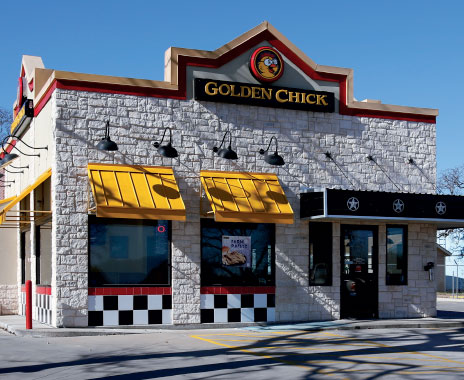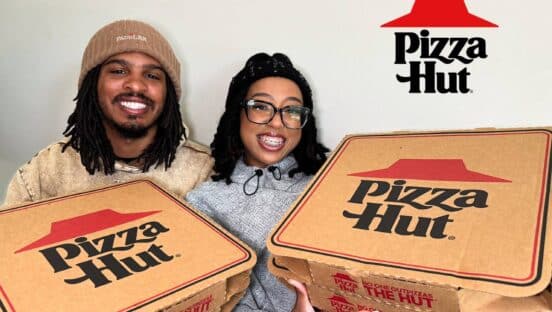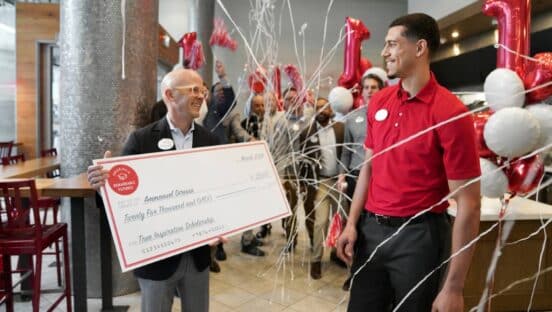Marketing departments spend months planning major promotional events, but when a natural disaster strikes, taking action is all that matters. Time becomes an enemy when moments mean the difference between lives saved and lost, and some quick-serve restaurants have found ways to make an immediate impact in the time of crisis.
In late 2013, Panda Restaurant Group Inc., parent company of Panda Express, quickly raised $645,000 through in-store and corporate donations to assist victims of Typhoon Haiyan in the Philippines. In May and June 2011, local Hardee’s restaurants and corporate employees rallied to raise funds in a hurry after a deadly tornado devastated Joplin, Missouri, where the brand operates four units.
These efforts materialize out of necessity, says Shay Ghafoor, owner of three Golden Chick restaurants in Texas. When a tornado tore through a nearby neighborhood in Granbury, Texas, Ghafoor didn’t think twice about doing what his group was in the business of doing: feeding people.
“I didn’t give it much thought,” he says. “Our neighbors were affected. People lost their lives. When people came in, we fed them. That’s the least we could have done.”
When an employee relayed stories of families living at a church relief center, his fried chicken restaurants fed them, too.
“I don’t think we did anything that a whole lot of people didn’t or wouldn’t do. There were people who did so much more,” Ghafoor says.
Responding with a rush of food, while helpful, is costly and puts a strain on normal operations, Ghafoor says, and Golden Chick suffered from a run on product. He says he didn’t expect to give away so much food and his team was ill prepared. Regular customers purchasing food, meanwhile, may not have been pleased, but Ghafoor continued doing as much as he could for people in need.
Anne Marie Borrego, spokeswoman for the American Red Cross, says giving, especially in the wake of disaster, often comes from a good place. “There is so much generosity. It’s really incredible to see everyone come together,” she says. Time and again she’s seen restaurants in particular step forward to help, surprising even her.
“There really isn’t a best practice for relief help,” Borrego says. “But probably the most efficient thing a restaurant can do is collect and donate funds.” She says needs change quickly after natural disasters, and raising funds allows the flexibility to change with those needs.
Michele Richman, owner of single-unit Your Way Cafe in Jacksonville, North Carolina, has taken a different tack to supporting locals in the time of crisis. “On the coast, it’s not an ‘if,’ it is a ‘when’ question,” she says. “We know someday Mother Nature is not going to be kind.”
Many of Richman’s guests are Marine wives from the nearby Camp Lejeune Marine base. They’re young and health-conscious but unaware how to prepare for disaster.
Having lived near the coast for most of her life, Richman says, she’s experienced her share of hurricanes and floods, so she knows how devastating it can be to face empty pantry shelves when stores are sold out of food and a storm comes knocking.
“We need to be preparing for the storm behind the storm that’s coming,” she says.
Last year, knowing the Atlantic hurricane season began June 1, Richman offered hurricane preparedness classes once a week throughout the month of June. “We cover very basic stuff,” she says. “Each class is themed, and we touch on food principles such as time and temperature. That sanitation—or lack of it—is the No. 1 reason people get ill. We talk a lot about our best friends, bleach, and a food thermometer. Really, it’s about sharing principles we’ve learned being in the restaurant business.”
Richman says organizing the classes was not about increasing business, but rather all about giving back. For operators whose neighborhoods face a natural disaster, helping becomes a logical course of action.
Ghafoor insists Golden Chick’s story is no story at all—he and his team acted out of circumstance. “This thing happened,” he says. “It could have been me or my family, and we wanted to help in any way we could.”
The team at Your Way Cafe has a history of charitable involvement that goes beyond the needs of the immediate community. The one-unit concept donated money last year to St. Jude’s with its “Have a Heart Latte” campaign. It also donated to cancer research using sales from its Suzie Smoothies, named in honor of a friend. But its classes continue to be one of the best ways Your Way Cafe gives back.
In the end, 2013 was a mild year for hurricanes, but one can never be too prepared, Richman says. Since offering the classes, she’s been contacted by local hotels to offer the same training to staff and plans to run classes for customers again in 2014.
In times of disaster, restaurants become more than businesses; they become human, the real faces of neighborhoods and neighbors in need. They aid others in the ways they can, knowing that while they can’t change what has happened, they can lend a helping hand.
Red Cross’s Borrego encourages restaurants to be proactive, adopting the “if, not when” thinking and developing a plan ahead of time.
“We might be able to develop something one on one,” she says, while also suggesting quick serves partner with other entities through pledged giving and response programs where funds can be funneled as needed.













